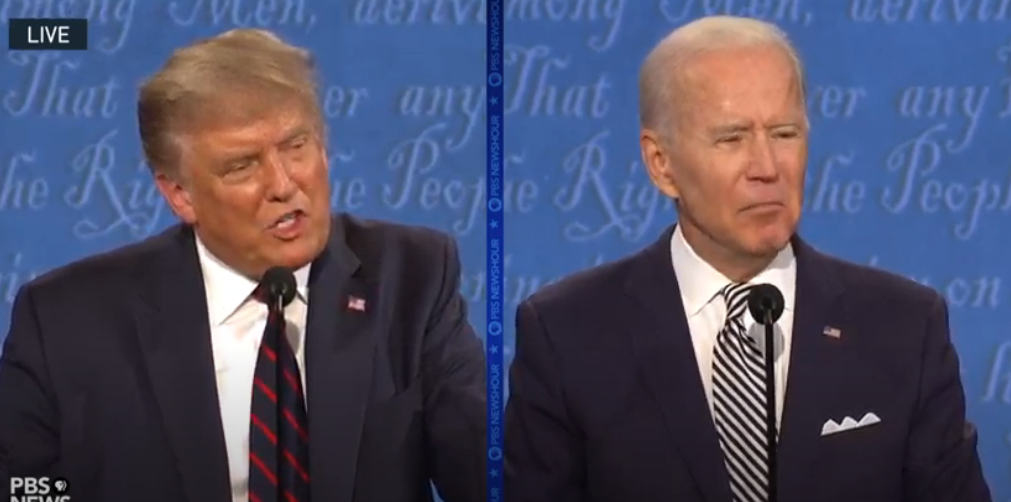
- Details
- By Levi Rickert
CLEVELAND — Republican President Donald Trump faced off against Democratic nominee, former Vice President Joe Biden on Tuesday night in one of the ugliest presidential debates in the history of the United States in Cleveland.
The 90-plus minutes were full of verbal sparring between both men, whose answers often touched on topics unrelated to the questions asked by moderator Chris Wallace, the host of Fox News Sunday. The president regularly spoke over Biden, with heckling and mocking him. The debate had its share of several insults and outright fabrications of the truth.
Trump interrupted both Biden and Wallace often throughout the debate. In some cases, he did not allow Wallace to finish asking his question. To deflect the insults, Biden several times looked straight into the camera as to speak to the nation, instead of engaging with Trump.
Within the first three minutes of the debate, in an attempt to put down Biden, Trump said, “If Pocahontas would've left two days early, you would've lost every primary on Super Tuesday,” referring to Biden’s Democratic opponent at the time, Sen. Elizabeth Warren. “You got very lucky.”
To American Indians, Trump’s usage of Pocahontas is a racial slur.
The remark by Trump, which dates back several years, went virtually unnoticed. Neither Biden nor Wallace pushed back.
The Supreme Court nomination of Amy Coney Barrett was the first topic discussed on Tuesday night. Trump nominated Barrett last Saturday before Justice Ruth Bader Ginsburg was buried on Tuesday. Almost 60 percent of Americans, including Biden and Democrats, feel that the person who wins the November election should fill the seat left vacant due to Ginsburg’s death.
Other topics of debate included Covid-19, the economy, law and order, and race relations in the United States.
Trump defended his handling of the Covid-19 pandemic that has left 205,000 Americans dead.
“It is what it is because you are who you are,” Biden fired back, referring to Trump’s words during an Aug. 4 HBO interview, in which the president dismissed the large number of deaths as a result of the virus.
One of the most profound moments of the debate came when Trump refused to categorically denounce white supremacists. Instead, Trump redirected Wallace’s question about the right-wing violence in Charlottesville, Va. and Portland, Ore. into an accusation against left-wing protesters.
“Are you willing to condemn right supremacist and militia groups that they need to stand down and not start the violence in these cities such as Kenosha and Portland? Are you prepared to do that?” Wallace questioned the president.
“Sure, I’m prepared to do that. I would say almost everything I see is from the left wing, not from the right wing. I’m willing to do anything. I want to see peace,” Trump responded.
Both Wallace and Biden asked him to “do it.”
Then Trump singled out one group with a statement to the Proud Boys, a neo-Nazi hate group that was involved in the “Unite the Right” rally in Charlottesville, Va. in 2017, which attracted a number of white supremacist groups.
Trump: “Proud Boys, stand back and stand by. I’ll tell you what, somebody’s got to do something about Antifa and the left. Because this is not a right-wing problem, this is a left-wing problem.”
Earlier this month, FBI Director Christopher Wray testified to the House Homeland Security Committee that the real terrorism threat and violence in the country has come from “racially motivated violent extremism” of white supremacists.
The debate occurred as much of the nation is already voting. Some one million ballots have already been cast in 18 states as of Tuesday.
Upcoming debates include:
- Oct. 7: Vice presidential debate between Vice President Pence and California Sen. Kamala Harris
- Oct. 15: Second presidential debate
- Oct. 22: Third presidential debate
More Stories Like This
Native News Weekly (August 25, 2024): D.C. BriefsNavajo Nation Mourns the Passing of Former Vice President Rex Lee Jim
Deb Haaland Earns Endorsement From Communications Workers of America Local 7076
University Soccer Standout Leads by Example
Two Native Americans Named to Democratic Congressional Campaign Committee's“Red to Blue” Program
Help us defend tribal sovereignty.
At Native News Online, our mission is rooted in telling the stories that strengthen sovereignty and uplift Indigenous voices — not just at year’s end, but every single day.
Because of your generosity last year, we were able to keep our reporters on the ground in tribal communities, at national gatherings and in the halls of Congress — covering the issues that matter most to Indian Country: sovereignty, culture, education, health and economic opportunity.
That support sustained us through a tough year in 2025. Now, as we look to the year ahead, we need your help right now to ensure warrior journalism remains strong — reporting that defends tribal sovereignty, amplifies Native truth, and holds power accountable.
 The stakes couldn't be higher. Your support keeps Native voices heard, Native stories told and Native sovereignty defended.
The stakes couldn't be higher. Your support keeps Native voices heard, Native stories told and Native sovereignty defended.
Stand with Warrior Journalism today.
Levi Rickert (Potawatomi), Editor & Publisher

